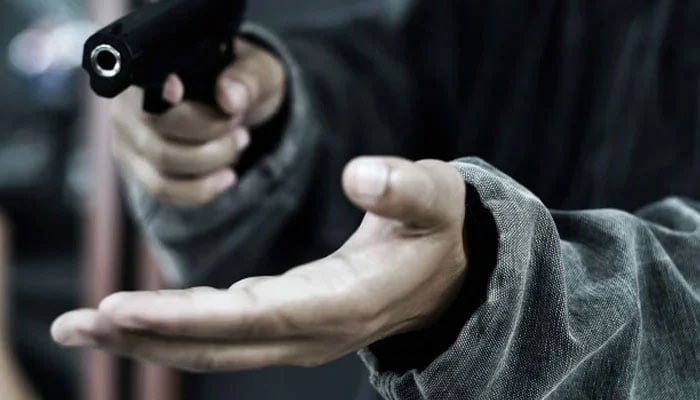No witnesses
If you live in Karachi, or anywhere else in Pakistan for that matter, you have likely been the victim of a crime at some point or the other. After the deed, most likely an armed robbery or burglary, it probably never even crossed your mind to report the case let alone show up in court to give evidence against the suspects. This is of course assuming that the police could even apprehend said suspects, something that happens rarely. On paper, it is almost as though the crime never happened. On the streets, it means criminals enjoy virtual impunity for their behaviour and can continue to victimize innocent people mostly unimpeded. The inability of the justice system in Pakistan to offer adequate protection to witnesses and complainants is a key reason behind the crime epidemic in many of our major cities. Without witnesses, instruments of law and order are effectively useless.
The rare instances that a witness does come forward and their tragic outcomes are more than enough to discourage people from breaking the unwritten code of silence. In 2015, a key witness in the murder of activist Sabeen Mahmud was shot dead. The man was reportedly Mahmud’s part-time driver and a police constable. In this context, it might surprise one to learn that Sindh has had a witness protection act since 2013. The act allows witnesses to conceal their identity or even establish a new one, testify via video link, and calls for the authorities to relocate witnesses, offer them accommodation, arrange transport for their belongings, provide financial assistance and even compensate heirs in the event that the witness is killed. It is doubtful the witnesses to Sabeen Mahmud’s murder ever got any such protection, two years after the law was implemented.
At times the gap between legislation and implementation in Pakistan is the size of the Grand Canyon and can only invoke a sense of tragicomedy above all else. Even a passing familiarity with the country’s police, underpaid, underequipped, undereducated and, in most cases, barely making ends meet, is enough to convince one how beyond them all of the things in the Sindh Witness Protection Act are. Unsurprisingly, even though the said act has been around for over a decade now, most would be unable to recall a single case of a witness being offered protection by the government. As such, the only means to enforce even a modicum of law and order in the country is often to skirt around the law itself and take action extrajudicially. However, as the Naqeebaullah Mehsud case has taught the country, this is no long-term solution and often can create more problems than it solves. No one can or should be above the law. We must get to the level where the witness protection laws in Pakistan are something other than a bad joke sitting on a file shelf in some department or the other. This means actually investing in those responsible for protecting witnesses. Meanwhile, the Sindh prosecutor general has reportedly said that the Witness Protection Act has not been implemented in letter and spirit and he has requested the home secretary to initiate it. That should do the trick.
-
 Super Bowl 2026 Live: Seahawks Lead Patriots 3-0 After Defensive First Quarter
Super Bowl 2026 Live: Seahawks Lead Patriots 3-0 After Defensive First Quarter -
 Bad Bunny's Super Bowl Halftime Show: What Time Will He Perform Tonight?
Bad Bunny's Super Bowl Halftime Show: What Time Will He Perform Tonight? -
 Where Is Super Bowl 2026 Taking Place? Everything To Know About The NFL Showdown
Where Is Super Bowl 2026 Taking Place? Everything To Know About The NFL Showdown -
 Drake 'turns Down' Chance To Hit Back At Kendrick Lamar At Super Bowl
Drake 'turns Down' Chance To Hit Back At Kendrick Lamar At Super Bowl -
 Sarah Ferguson Had A ‘psychosexual Network’ With Jeffrey Epstein
Sarah Ferguson Had A ‘psychosexual Network’ With Jeffrey Epstein -
 Czech Republic Supports Social Media Ban For Under-15
Czech Republic Supports Social Media Ban For Under-15 -
 Khloe Kardashian Shares How She And Her Sisters Handle Money Between Themselves
Khloe Kardashian Shares How She And Her Sisters Handle Money Between Themselves -
 Prince William Ready To End 'shielding' Of ‘disgraced’ Andrew Amid Epstein Scandal
Prince William Ready To End 'shielding' Of ‘disgraced’ Andrew Amid Epstein Scandal -
 Chris Hemsworth Hailed By Halle Berry For Sweet Gesture
Chris Hemsworth Hailed By Halle Berry For Sweet Gesture -
 Blac Chyna Reveals Her New Approach To Love, Healing After Recent Heartbreak
Blac Chyna Reveals Her New Approach To Love, Healing After Recent Heartbreak -
 Royal Family's Approach To Deal With Andrew Finally Revealed
Royal Family's Approach To Deal With Andrew Finally Revealed -
 Super Bowl Weekend Deals Blow To 'Melania' Documentary's Box Office
Super Bowl Weekend Deals Blow To 'Melania' Documentary's Box Office -
 Meghan Markle Shares Glitzy Clips From Fifteen Percent Pledge Gala
Meghan Markle Shares Glitzy Clips From Fifteen Percent Pledge Gala -
 Melissa Jon Hart Explains Rare Reason Behind Not Revisting Old Roles
Melissa Jon Hart Explains Rare Reason Behind Not Revisting Old Roles -
 Meghan Markle Eyeing On ‘Queen’ As Ultimate Goal
Meghan Markle Eyeing On ‘Queen’ As Ultimate Goal -
 Japan Elects Takaichi As First Woman Prime Minister After Sweeping Vote
Japan Elects Takaichi As First Woman Prime Minister After Sweeping Vote




